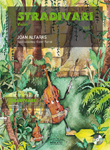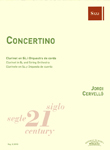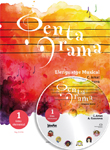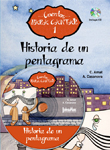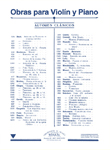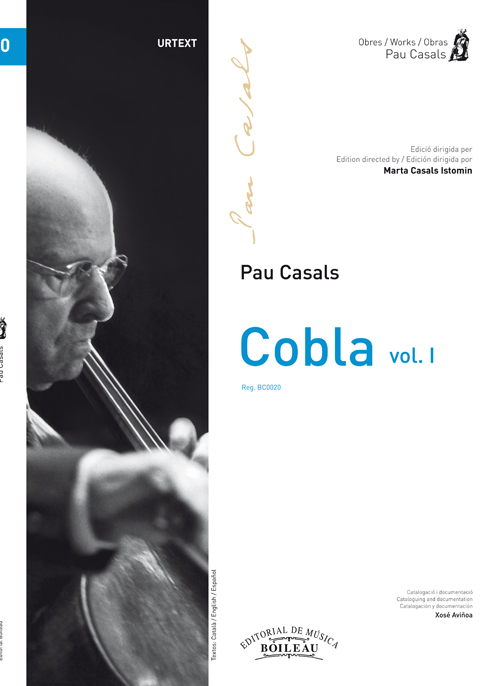Cobla I
Sardanes (partitura general)
Cobla
CASALS, Pau; CASALS, PabloReg.: BC0020
21,00 €
P.V.P. (VAT included 4%)
Add to cart
- Arrangement: CASALS, Enric
- Review: CASALS ISTOMIN, Marta; SERRACANT, Josep Maria
- Ensemble: Cobla: .
- Genres: Classical / contemporary: Chamber.
Folk music / traditional: Sardanas.
- Product format: Partitura
- Difficulty level: Intermediate
- Period: 1st half S. XX
- Publishing house: Editorial Boileau
- Collection: Pau Casals
- No. of pages: 52
- Measure: 31,00 x 23,00 cm
- Lenght: 16'20"
- ISBN: 978-84-171994-52
- ISMN: 979-0-3503-4117-5
- Available in digital: No
- Available for rent: No
Cobla [flbl.2tipls.2tnres.2tpt.1tmb.2fisc.db]
THE MATERIALS ARE SOLD SEPARATELY
As part of the publication of the complete works by Pau Casals, this volume presents the first group of his Sardanas in their version for cobla. Thus, in a certain sense, it complements the previously publication of the piano version of the Sardanas which, as was commented in that edition, were, for the most part, the original versions of those works.
The research for this edition was done by Josep-Maria Serracant in the archive of the Asociación Músicos por la Cobla [Association of Musicians for the Cobla.] The revision of the scores was completed by Bernat Castillejo and Jesús Ventura for the performance of these works by the Cobla de Cámara de Cataluña [Chamber Cobla of Catalnuya] in the Auditorio Pau Casals at Sant Salvador in El Vendrell during the summer of 2017.
Festívola
Casals’ first sardana was composed 1917 and was titled Festívola. It is not known who created the instrumentation for cobla, although we do not believe that it not done by the composer since he did not arrange any of his sardanas for cobla. The original version for piano solo was previously published by Boileau.
Sardana Melodía del Pelegrí [Sardana—Melody from Pelegrí]
This work was composed in 1927 for a homage to Casals organized by his native city, El Vendrell. During the festivities Casals was presented with a silver argolla de gralla [a device designed to hold the music of the instrumental parts attached to a gralla, a traditional Catalan double-reed wind instrument]. The title of this sardana refers to a family of gralleros, musicians who play the instrument, the Pelegrí family who were from Bellvei in the province of Tarragona and represented by the grallerist Francesc Castellví i Romeu. Casals titled the sardana “Sardana Melodía del Pelegrí” [Sardana on a Melody of the Pelegrí family] thus making reference to his use in the opening phrase of the section of the sardana corresponding to the short steps of the dancers of a melody by the grallerist Francesc Castellví i Romeu.
The instrumental version for cobla is preserved in the Archive of the Agrupación Cultural Folclórica de Barcelona [Folkloric Cultural Association of Barcelona] with the title “En Pelegrí”. On the covers of the instrumental parts for the work the names of the composers were given as “Castellví-Casals”. Knowing Casals’s use of the melody composed by Francesc Castellví i Romeu in this sardana and comparing the piano version of the work with that for cobla the relationship between the two versions is clearly and unequivocally confirmed. In the instrumental parts there is no indication of the person who created the instrumentation, although the name of the copyist is indicated. It is likely that the instrumentation was created by Josep Serra y Bonal (1874-1939) due to his distinctive manner of treating the piccolo, which is especially notable in his sardanas.
Sardana en Do Mayor [Sardana in C Major]
The third sardana in this volume is the “Sardana in C Major” which has a very interesting history.
When Felip Vila, flabiolista [a player of the flabiol, a Catalan woodwind instrument] of the Cobla Barcelona, donated his musical archive to the Músics per la Cobla [Musicians for the Cobla], a collection of instrumental parts for cobla was found. None of the instrumental parts were titled by on the cover of each one was the indication: “Sardana de Pau Casals” [Sardana by Pau Casals]. On each of the parts the name of the appropriate instrument was indicated as well as the name “Pau Casals”. These titles and the engraving of the music itself was the work of the composer’s brother, Enric Casals. Thus, the authors of both the music and the instrumentation were clearly designated.
These statements were confirmed through Felip Vila. He explained that during the 1970’s (which marked the final years of the existence of the Cobla Barcelona) Enric Casals requested that in a rehearsal the Cobla Barcelona would perform a sardana by his brother. In the end, it was not just one rehearsal, but rather several during which the Cobla Barcelona read the work. After the first rehearsals, Enric collected the parts to make corrections. For the final rehearsal the parts were completed and were subsequently preserved in the archive of the Cobla Barcelona. For more than 40 years after the Cobla Barcelona ceased activity in the mid-1970’s the archive was kept at the home of Felip Vila until the archive was given to Boileau and were able to study its contents.
Secondly, the Editorial Boileau edition of the sardanas for piano by Pau Casals contains one titled “Sardana in C Major”, which is dated 1943, Prada de Conflent. This sardana corresponds to the sardana found in the archive of the Cobla Barcelona which was preserved in the parts for the instrumentation of the work which had been done by Enric Casals, just as he had done for so many other works by his brother, Pau. This edition is based on the manuscript for piano preserved by the Pau Casals Foundation in El Vendrell.
Once the score and parts of the edition for cobla had be engraved by Jesús Ventura, we realized the importance of the work and arranged for its premiere along with other «discoveries» from the archive of the Cobla Barcelona. The premiere was performed by the Cobla Mediterránea under the direction of Bernat Castillejo, who had created the final version of the score.
Josep Maria Serracant
1.
Pau Casals, apunt biogràfic
Pau Casals, biographical notes
Pau Casals, apunte biográfico
2.
Criteri de l’edició
Criteria for the publication
Criterio de la edición
3.
Criteri de la documentació i catalogació
Documentation and cataloguing criteria
Criterio de la documentación y catalogación
4.
Introducció a l’obra
Introduction to the work
Introducción a la obra
5.
Partitures / Scores / Partituras:
Festívola
Sardana “melodia Pelegrí”
Sardana en Do Major
6.
Catàleg / Catalog / Catálogo

